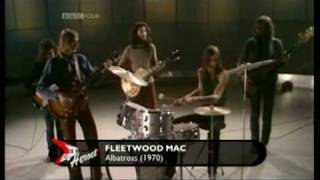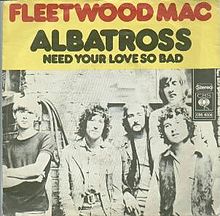| You are not logged in. | login to customize your own personal play list |
“Albatross” by Fleetwood Mac |
| United States Federal Trade Commission forbids anyone under 13 from viewing these music videos! |
| You are not logged in. | login to customize your own personal play list |
“Albatross” by Fleetwood Mac |
| United States Federal Trade Commission forbids anyone under 13 from viewing these music videos! |
 |
 |
 |
 |
You need Flash player 8+ and JavaScript enabled to view this video.
|
 |
 |
   |
 |
1970 UK TV Performance

1970 UK TV Performance
song info
 “Albatross” is an early ambient instrumental recorded by rock band Fleetwood Mac. This version features Peter Green. The song “Albatross” was the inspiration for the Beatle’s “Sun King” from the Abbey Road album. Song Title: AlbatrossArtist: Fleetwood Mac featuring Peter Green Genre: blues, blues rock, instrumental rock, ambient Composer: Copyright © 1968 Peter Green Lead Guitar: Peter Green (Fender Stratocaster) Rhythm Guitar: Danny Kirwan Bass Guitar: Peter Green Bass: John McVie Drums: Mick Fleetwood (playing with timpani mallets) Producer: Mike Vernon Recorded: October 1968 Released: 22 November 1968 Format: 7" 45-rpm vinyl single B-side: “Jigsaw Puzzle Blues” Label: Blue Horizon BH 57-3145 This song is the number three (3) greatest blues instrumental of all time according to Digital Dream Door’s Rick Varner. Number of listens: 25920Current rank: 1148 (updated weekly) Highest rank: 1134 (play the video all the way through to register a vote for this song) Translations courtesy of Apple and Google. |
||

Summary quotation from Wikipedia:
“Albatross” is a guitar-based instrumental by Fleetwood Mac, released as a single in November 1968, later featuring on the compilation albums The Pious Bird of Good Omen (UK) and English Rose (USA). The piece was composed by Peter Green.
Composition
Santo & Johnny’s Sleepwalk (1959) inspired Peter Green for his 1968 instrumental “Albatross”. The composition and its arrangement suggest a relaxing sea setting, with cymbals imitating the sound of waves (Mick Fleetwood played his drum kit using timpani mallets to give a muted sound) and a dreamy solo from Green’s guitar. It contains four chords, E, Emaj7, A, and F♯m, and could be seen as an early ambient work. It is often assumed that Green used his Les Paul but he said it was his Fender Stratocaster, as there is subtle use of the vibrato bar. The Les Paul that Green used in Fleetwood Mac has a nasal tone like that achieved in the in-between positions of a Stratocaster, and heard in the tune.
Green had been working on the piece for some time before the addition to the band of 18-year-old guitarist Danny Kirwan. Slide guitarist Jeremy Spencer was not generally inclined to work with Green, who had felt unable to realise the overall effect that he wanted. With Kirwan’s input, Green completed the piece and it was recorded just two months after Kirwan joined, without Spencer present. Kirwan’s instrumental “Jigsaw Puzzle Blues” was chosen for the B-side in most territories. “Albatross” has been re-released many times as a single in various countries, with many different B-sides.
It has been suggested that the piece is associated with the metaphorical use of the word albatross to mean a wearisome burden. This use of the word “Albatross,” suggesting an encumbrance around someone’s neck, is an allusion to Coleridge’s poem The Rime of the Ancient Mariner (1798). It is unclear whether Fleetwood Mac intended the title to evoke this meaning or if it simply refers to the bird; but the title of the UK compilation album it appears on, The Pious Bird of Good Omen, alludes to and quotes from the Coleridge poem.
This composition is one of only a few tracks by the original line-up of Fleetwood Mac that is included on their later “greatest hits” and “best of” compilations. Many of their compilations only focus on hits from the 1970s and 1980s. However, other compositions from that period have gone on to become classic recordings in the hands of other performers — “Black Magic Woman” as recorded by Santana for example. Another example, “Oh Well” has gone on to become a rock standard. “Albatross” is the only Fleetwood Mac composition with the distinction of having inspired a Beatles song, “Sun King” from 1969’s Abbey Road.
One of the earliest uses of the tune was on the soundtrack for the Rainer Werner Fassbinder sci-fi virtual reality film Welt am Draht (usually translated as World on a Wire). It was featured (along with “Jigsaw Puzzle Blues”) in 1979’s Rock ‘n’ Roll High School It was also used by the BBC as the theme music to a long running travel programme in the 1970s.
The piece was used as the background music to Marks & Spencer’s 2005 advertising campaign. In March of that year, Q magazine placed it at number 37 in its list of the 100 Greatest Guitar Tracks.
Apart from being used in Welt am Draht (World on a Wire), the track can also be heard in the film Man on Wire about Philippe Petit’s 1974 high-wire walk between the Twin Towers of New York’s World Trade Center.
The distinctive slide guitar motif is a recurring theme on The KLF’s 1990 album Chill Out.
The tune found even more fans after being remade by a German ambient musical project B-Tribe on their album Suave Suave in 1995.
Side notes
Fleetwood Mac became associated with this piece in the British public consciousness despite having numerous other well-received singles. In other territories, however, the greater iconic body of Fleetwood Mac hits came after the departure of Peter Green in 1970 and other line-up changes took place (including the addition of Stevie Nicks and Lindsey Buckingham in 1975). This is particularly true of North America, where “Albatross” was not a hit.
While the tune influenced an entire generation of guitarists, “Albatross” was a clear influence on Pink Floyd's David Gilmour's playing style, from the single-string three note bends, the rhythmic pulsing bass and harmony guitars, to its spacey ambience. On numerous occasions Gilmour has acknowledged the influence of Green on his style, and performed “Albatross” on Jools Holland's BBC Radio 2 show on 10 November 2008.
—from Wikipedia (the Wikipedia:Text of Creative Commons Attribution-ShareAlike 3.0 Unported License applies to Wikipedia’s block of text and possible accompanying picture, along with any alterations, transformations, and/or building upon Wikipedia’s original text that ThisSideofSanity.com applied to this block of text)
The Americans with Disabilities Act (ADA) and U.S. Government Section 508 of the Rehabilitation Act of 1973 require that web sites provide transcripts of audio for the deaf.
We will be adding lyrics to all songs as fast as we can. Please be patient.
Cheng: This is my favorite song.
To submit a comment, use the form below:
Please use the form (with the delay for a human to inspect it) because this website is attacked by more than 20 spam attempts per minute. The only way to keep you safe from the spam is by having human review.
 |
  |
|
If you spot an error in fact, grammar, syntax, or spelling, or a broken link, or have additional information, commentary, or constructive criticism, please contact us.
Copyright © 2014 Milo. All rights reserved. Todos Derechos Reservados. The copyrights on all source code and the data base belong to Milo and are used on this web site by permission.
The source code is at OSdata.com, released under Apache License 2.0.
Copyright 2012, 2013, 2014 Milo
Licensed under the Apache License, Version 2.0 (the “License”); you may not use this file except in compliance with the License. You may obtain a copy of the License at:
http://www.apache.org/licenses/LICENSE-2.0
Unless required by applicable law or agreed to in writing, software distributed under the License is distributed on an “AS IS” BASIS, WITHOUT WARRANTIES OR CONDITIONS OF ANY KIND, either express or implied. See the License for the specific language governing permissions and limitations under the License.
Enjoy the This Side of Sanity website Twitter feed.
Enjoy the This Side of Sanity Twitter feed.

|
player artwork by michaelm